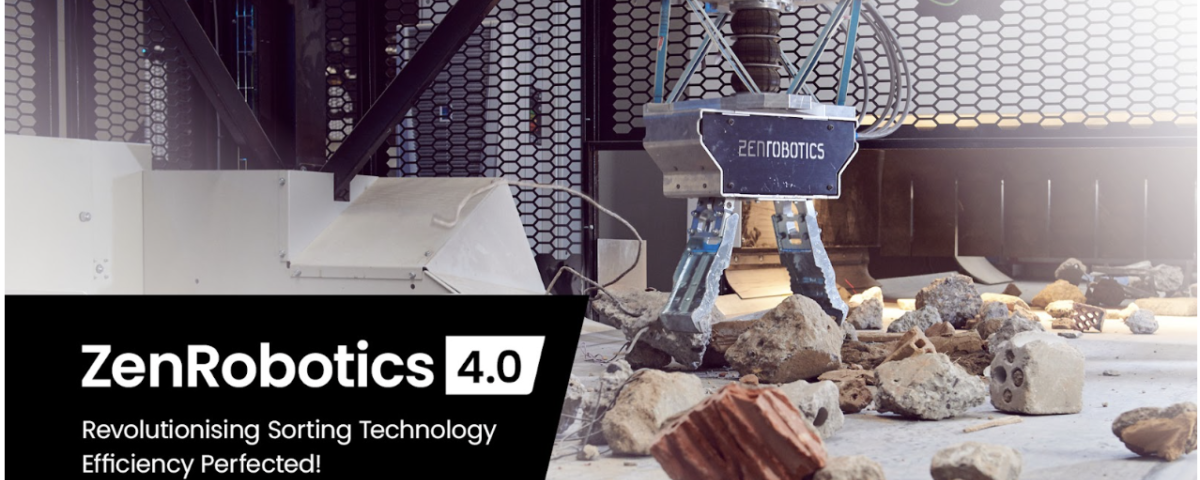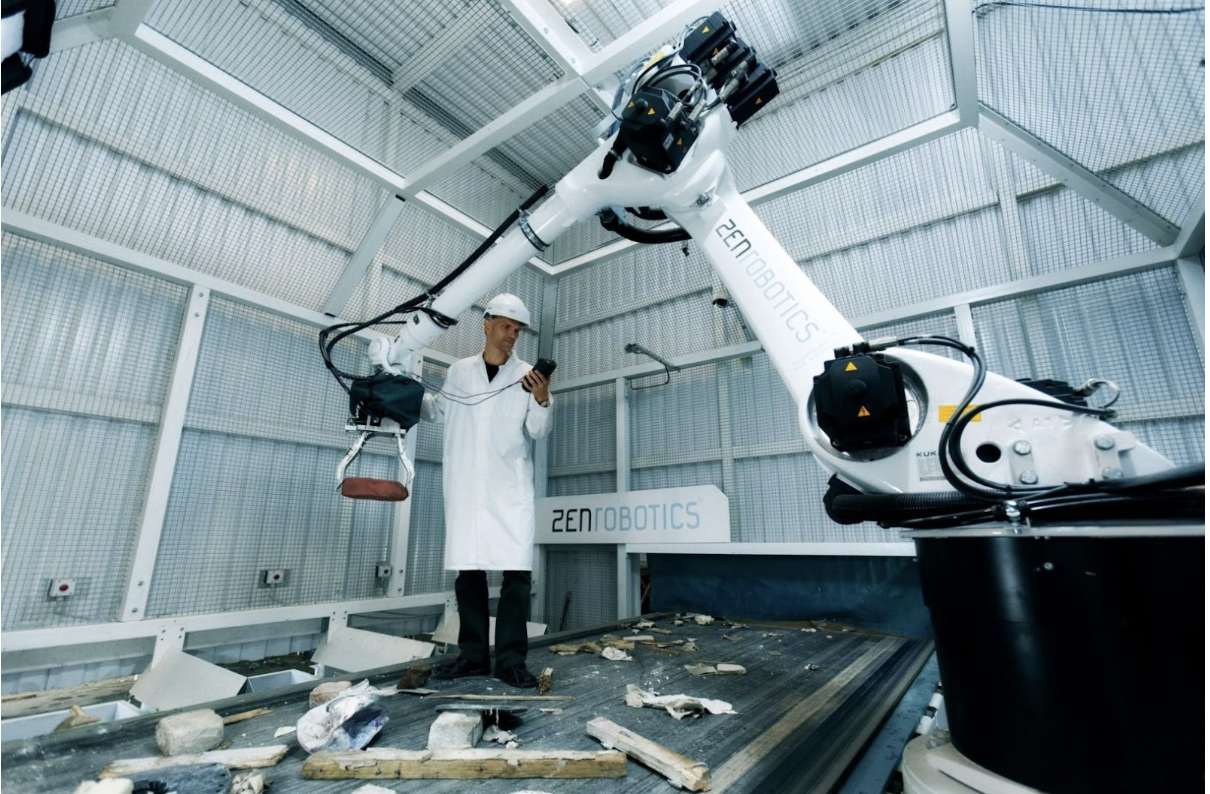




Keep this story going! Share below!
ZenRobotics’ solution represents nearly two decades of AI expertise and innovation — the world’s first AI-driven waste-sorting system. Using its proprietary AI solution - ZenBrain, the system identifies and separates hundreds of materials from mixed waste streams with remarkable precision. In doing so, ZenRobotics directly advances SDG 12 (Responsible Consumption and Production), SDG 13 (Climate Action), and SDG 8 (Decent Work and Economic Growth) by reducing landfill waste, cutting emissions, and replacing dangerous manual sorting jobs with safer, technology-driven solutions.
At the heart of ZenRobotics’ innovation is an AI-powered robotic sorting system that redefines recycling efficiency. Traditional waste recycling sorting has long relied on manual sorting and human labor, which is physically demanding, hazardous, and slow. ZenRobotics replaces the need for manual sorting with robotic arms guided by ZenBrain, the company’s advanced recognition system. ZenBrain is trained to identify and distinguish more than 500 types of materials based on shape, size, composition, and even economic value.
The company was founded in 2007, when a team of AI scientists joined forces with a recycling industry visionary who realized that artificial intelligence could solve one of the sector’s biggest challenges: sorting through mixed construction and demolition waste. At that time, no effective method existed for sorting bulky waste streams. ZenRobotics filled this gap by introducing a scalable, efficient, and safe system for recovering valuable materials that would otherwise end up in landfills or incinerators.
Today, ZenRobotics’ systems are deployed globally, capable of handling construction, demolition, municipal, and industrial waste. By bringing automation to the sorting process, the company not only improves efficiency for waste operators but also drives broader sustainability goals — improving recycling rates, reducing CO₂ emissions, and securing a steady supply of secondary raw materials for local industries. In doing so, ZenRobotics reshapes waste management into a catalyst for circular economy growth while directly supporting multiple UN SDGs.

ZenRobotics’ origin story is deeply personal for the founders — sparked by curiosity and conviction. Co-founder Rainer Rehn recalls being inspired as a student after reading a newspaper article that claimed “The environmental and waste management business in California was growing faster than the IT sector,” he says (personal communication, September 18, 2025). That realization ignited his lifelong passion for recycling. As Rehn emphasizes, “Most of the people who work in the recycling business have this deep urge to do something — a sense of emergency. Now we need to do something.”
The company’s true breakthrough came at a garden party in Helsinki in 2009, when two scientists mentioned that they had developed an AI system capable of recognizing and manipulating objects but had not yet found a real-world application. Rehn immediately connected the dots: “I knew what to use those machines for. That’s where it started,” he recalls (personal communication, September 18, 2025). Within a year, he had joined forces with the scientists — combining their academic expertise with his industry insight — to tackle one of recycling’s greatest bottlenecks: efficient sorting.
For Rehn, innovation begins with vision and imagination. “You must first imagine something… Nothing can stop it, actually, if your vision is clear enough,” he explains (personal communication, September 18, 2025). That vision transformed ZenRobotics from an idea into a global leader in sustainable waste management, proving that technology guided by purpose can overcome even the most complex challenges.
ZenRobotics’ AI-integrated waste-sorting solution has generated broad-reaching impacts for both the environment and society. Its proprietary AI systems reclaim vast quantities of valuable raw materials that would otherwise go to waste. Through the recovery of materials such as plastics, metals, and other recyclable debris, ZenRobotics directly reduces the incineration and landfill rates of these materials. This impact is closely linked with SDG 12 (Responsible Consumption and Production) and SDG 13 (Climate Action), both of which emphasize circularity and climate change mitigation.
In the short term, ZenRobotics improves waste-sorting efficiency. As highlighted by Rainer Rehn, their AI-powered robots are capable of working around the clock, reducing the need for humans to perform dangerous and monotonous tasks. The company has numerous case studies demonstrating this short-term positive impact. For instance, one waste management customer facility in Malmö, Sweden, achieved a CO₂-negative status as a direct result of integrating ZenRobotics’ systems. This is just one of many such examples worldwide.
In the long term, ZenRobotics’ involvement in waste management lays the foundation for broader systemic change. Specifically, the company contributes to the growing movement to develop an industry for raw-material recovery. This is particularly relevant in the European context — as Rehn points out, Europe still has an immense reliance on raw material imports. ZenRobotics’ numerous success stories demonstrate that its innovations are scalable, sustainability-driven, commercially viable and have a clear net positive impact.
In addition to being a global pioneer in achieving sustainability goals through AI and robotics, ZenRobotics’ innovations have brought the company significant business success. Before ZenRobotics, the use of AI and robotics in waste management was largely unprecedented — the company effectively carved out an entirely new business niche. Initially, the absence of competition created a sense of uncertainty. However, through persistence and innovation, ZenRobotics attracted an early customer base of forward-thinking firms. As a result, the company was propelled to the forefront of the AI waste management industry and has since built a broad portfolio of successful clients.
ZenRobotics’ customers report numerous improvements in their operations. For instance, Sogetri, a Swiss client, set a goal of achieving 100% recyclability (ZenRobotics, 2020). After implementing ZenRobotics’ systems, Sogetri reached an 80% recycling rate, with strong potential for further growth through continued collaboration. Additionally, Sogetri reported enhanced employee well-being as human workers were reassigned to sort smaller, safer waste streams, away from hazardous materials.
This sentiment is echoed by Rainer Rehn, who explains that customers’ employees were not laid off during the integration of ZenRobotics’ systems. Instead, companies hired additional staff to manage higher waste volumes and oversee robotic operations. This dynamic created a powerful business engine for ZenRobotics: customers experienced immediate efficiency gains, driving greater demand for the company’s solutions. Rehn also highlights the sense of purpose instilled in ZenRobotics’ own team through their sustainability-driven mission and their ability to truly “walk the talk.”
Rainer Rehn states, “The robots do this dull, extremely dull, dangerous, dirty job on behalf of people… Our greatest fan club are the hand sorters; they understand how good these robots are” (personal communication, September 18, 2025). As a result, ZenRobotics’ innovation has greatly reduced the need for humans to work under substandard and hazardous conditions. Another societal benefit generated by ZenRobotics is the creation of new job roles in waste management. Rehn describes how it is common for former hand sorters to move into robotics supervision and maintenance roles within their existing workplaces — positions they find highly fulfilling. Furthermore, improving waste management in any given region encourages the growth of an ecosystem of local sustainable enterprises, driving further engagement in circular economy practices.
ZenRobotics’ innovation also delivers clear environmental benefits. Reduced incineration and landfill rates directly lower greenhouse gas emissions, while local recycling minimizes CO₂ output from transporting waste and raw materials. The company’s technology promotes circularity by significantly enhancing the recovery and reuse of materials, thereby extending their lifespans. As Rehn explains, “Waste should not be wasted. It’s just raw materials. We call it waste when they are mixed” (personal communication, September 18, 2025).
Overall, ZenRobotics improves waste management efficiency by enabling customers to handle higher sorting volumes with greater accuracy — resulting in a measurable positive environmental impact. By creating safer, higher-skilled jobs (SDG 8), driving technological innovation and sustainable infrastructure (SDG 9), advancing circular resource use (SDG 12), and cutting carbon emissions (SDG 13), ZenRobotics demonstrates how artificial intelligence can power both economic growth and environmental sustainability.
Get stories of positive business innovations from around the world delivered right to your inbox.

ZenRobotics, founded in Helsinki, Finland, is a pioneer in artificial intelligence (AI)-integrated waste management robotics. The company designs and delivers robotic systems that autonomously sort mixed waste streams into valuable recyclables. Serving global waste management companies and local communities, ZenRobotics helps its partners reduce landfill dependency, improve worker safety, and advance toward a circular economy.